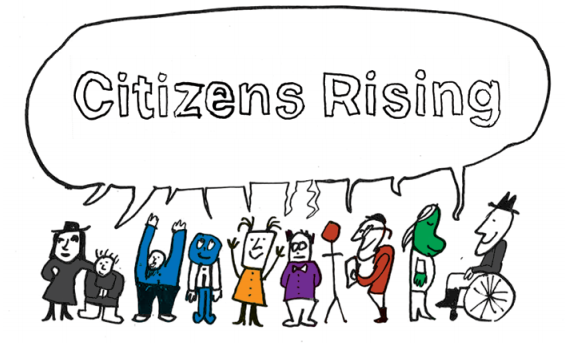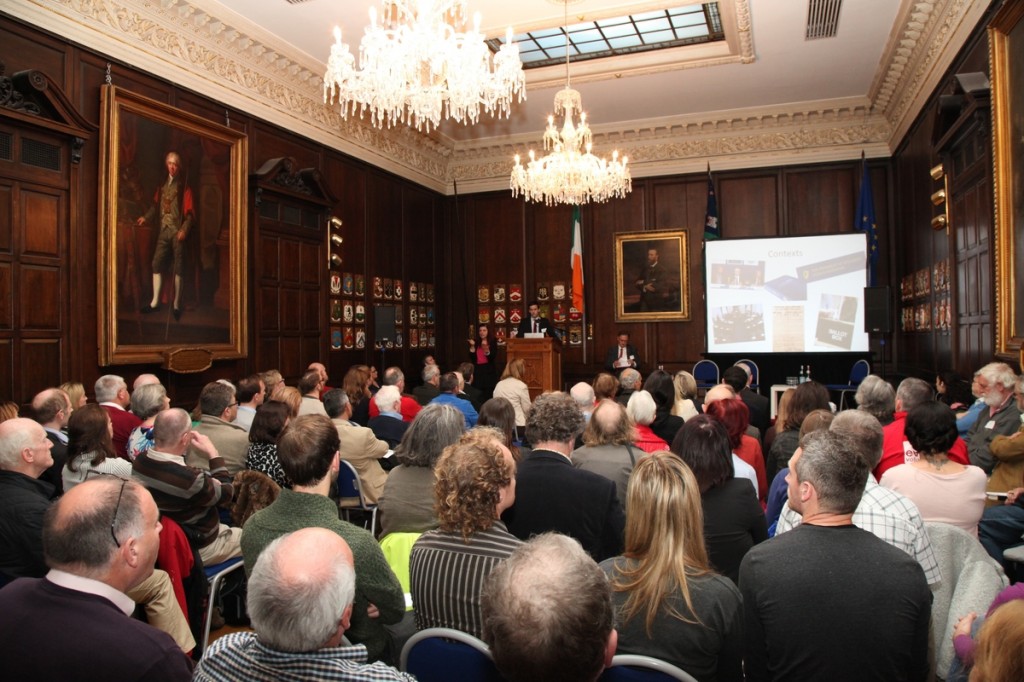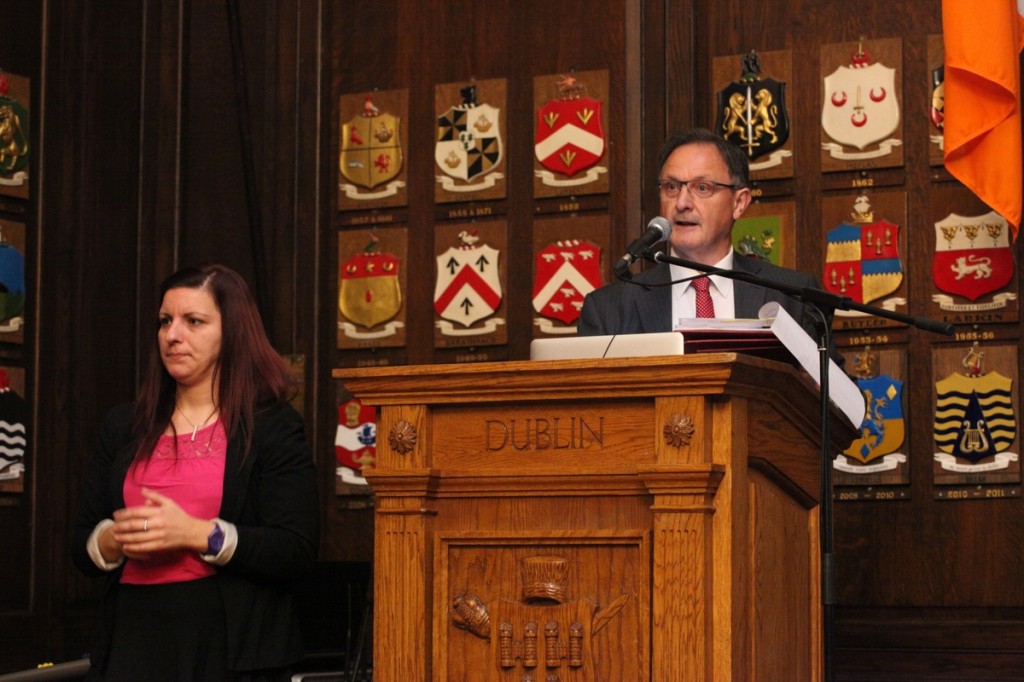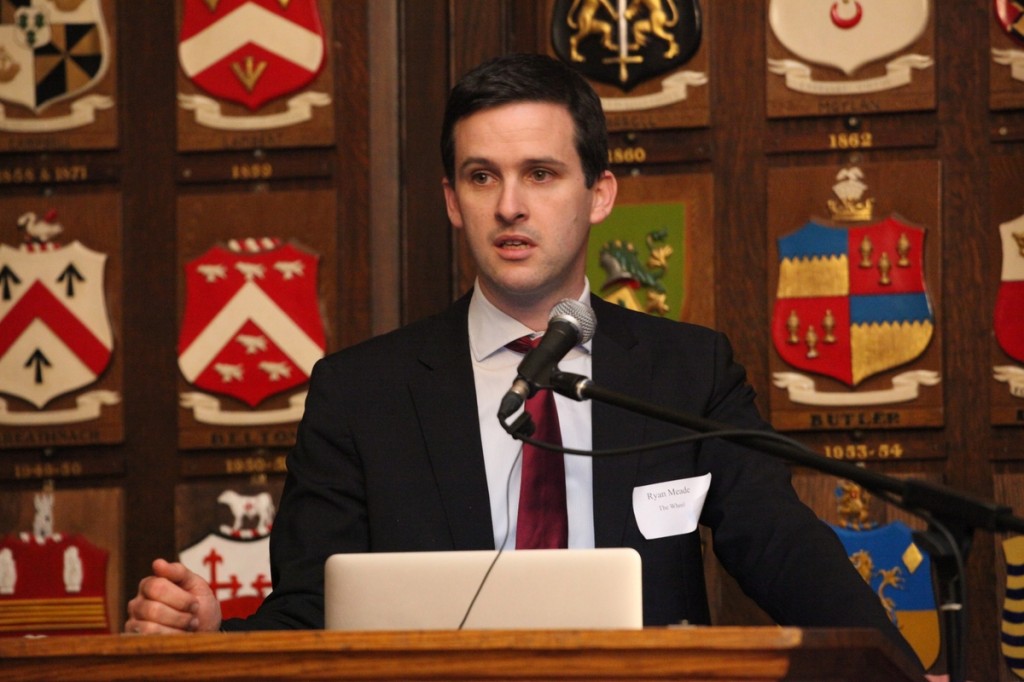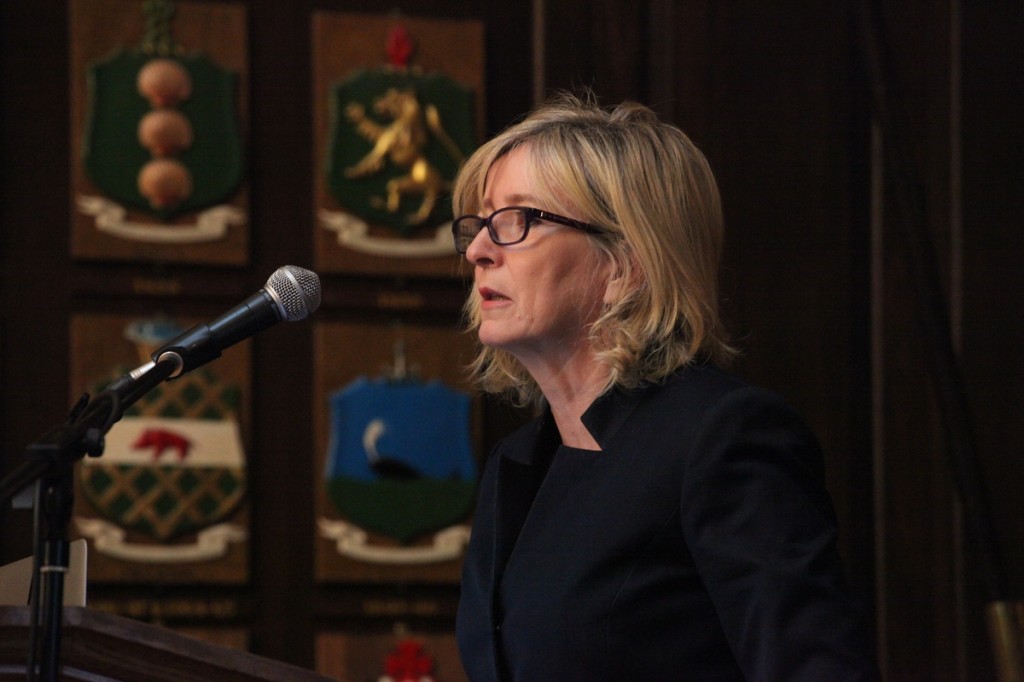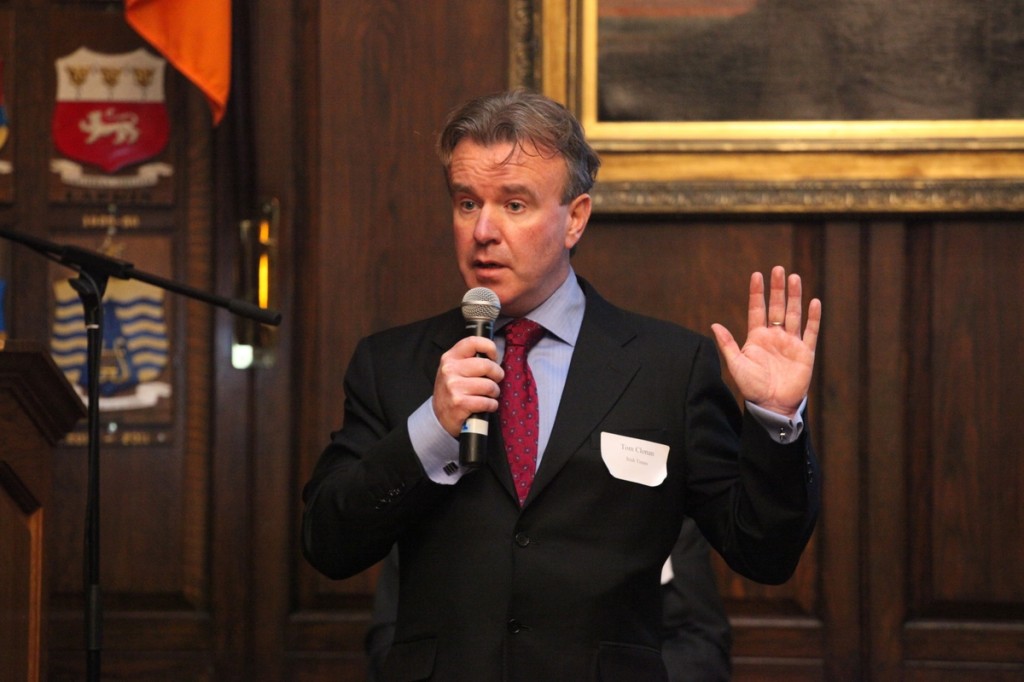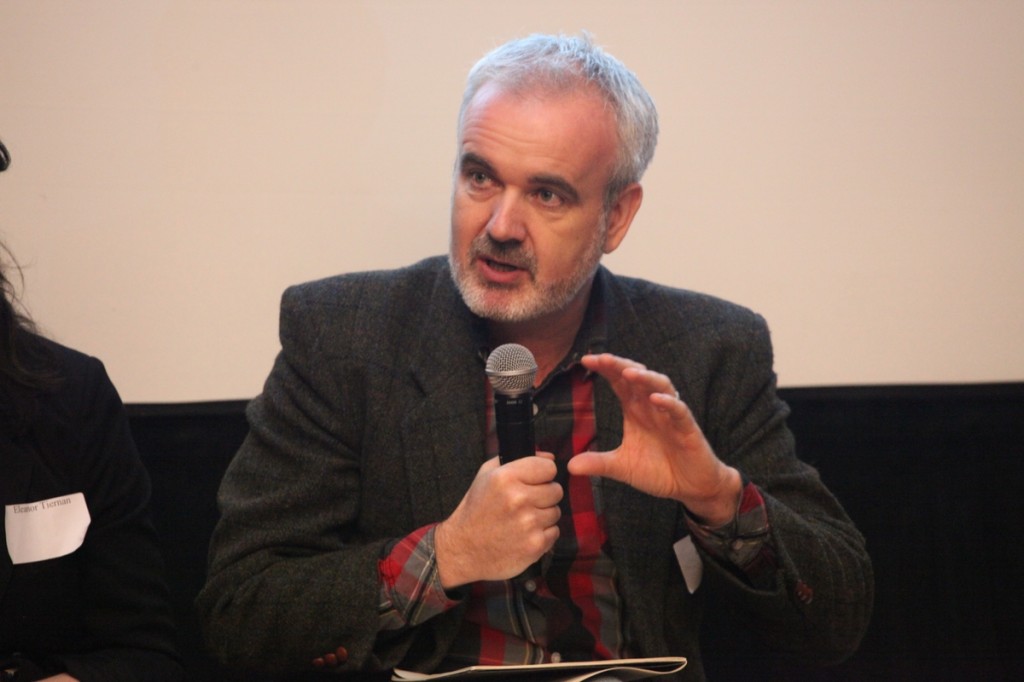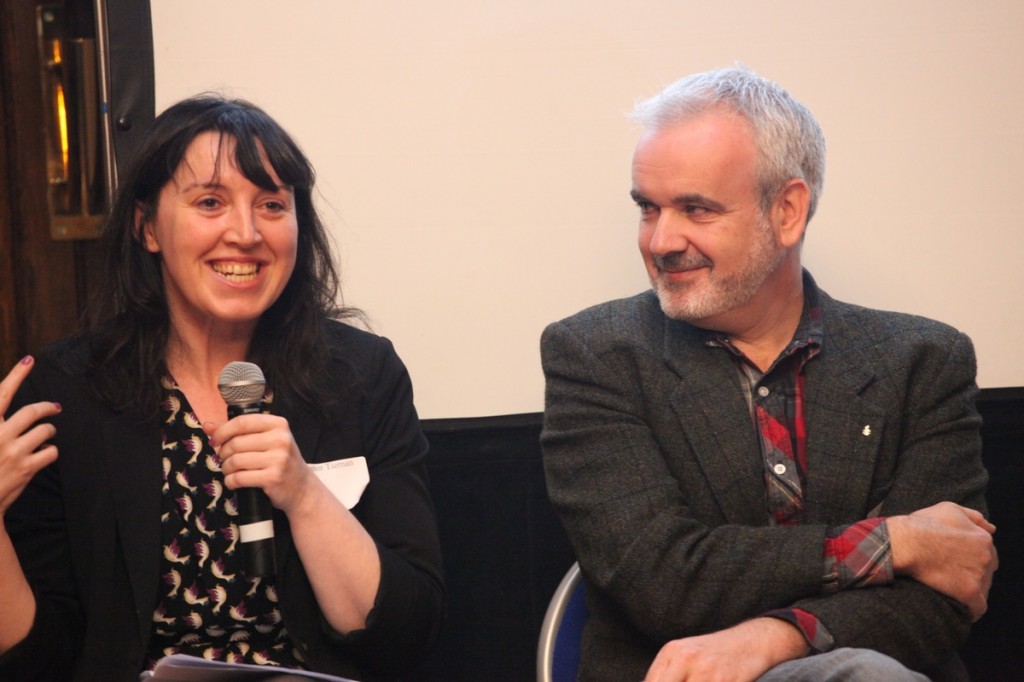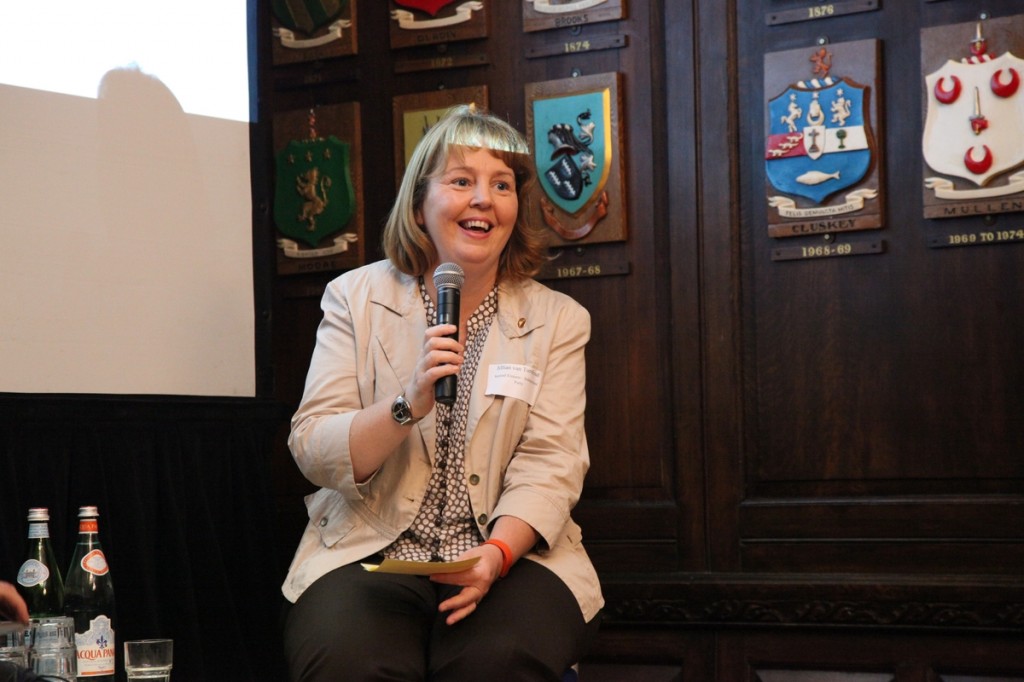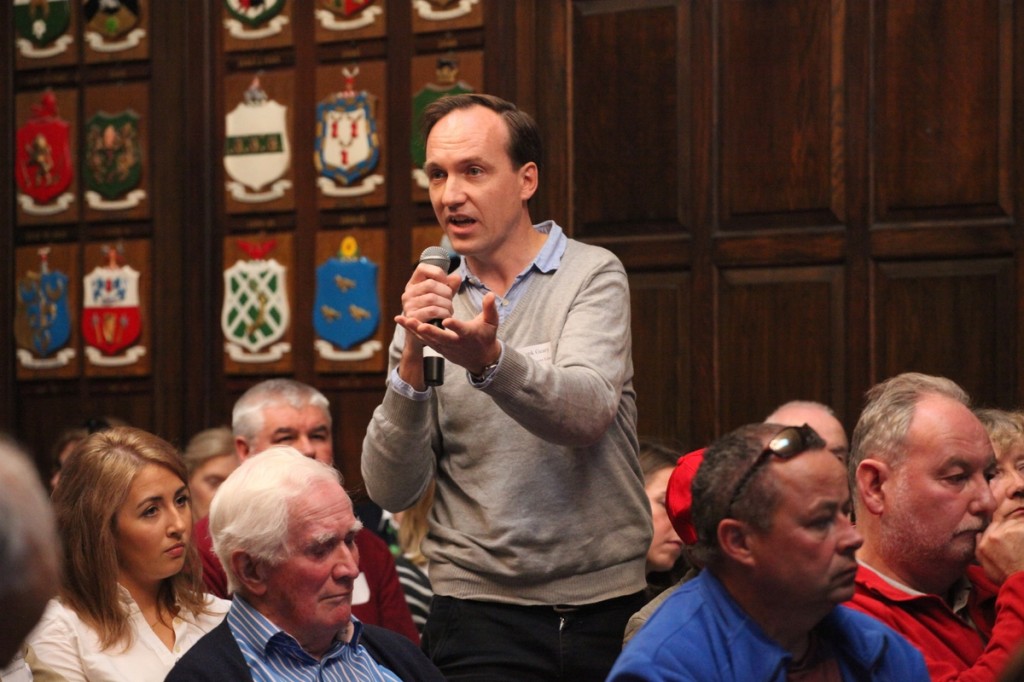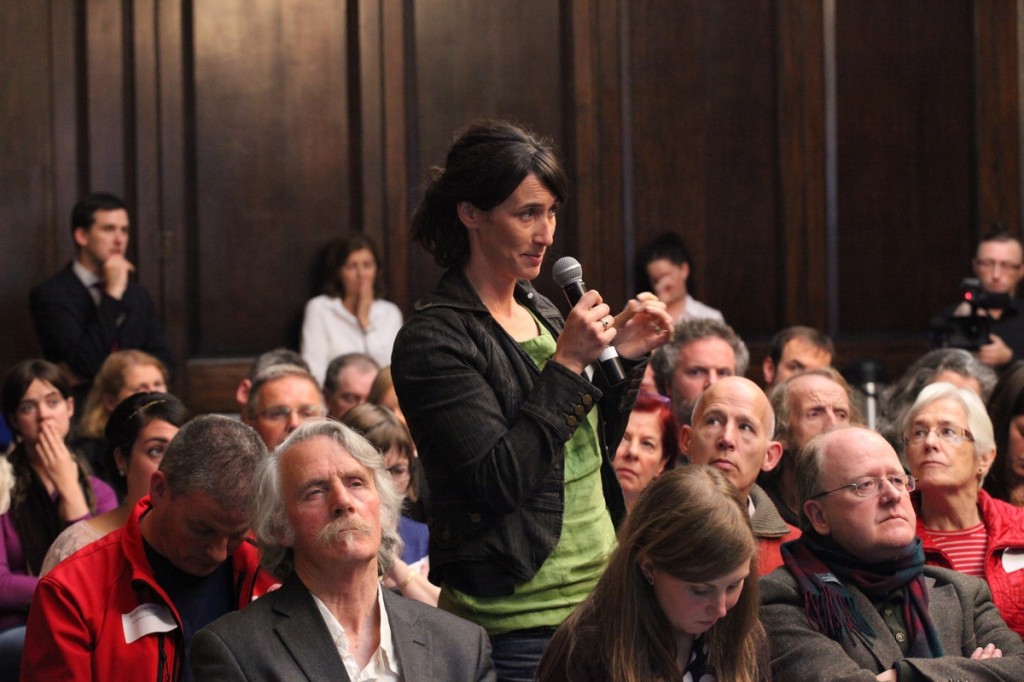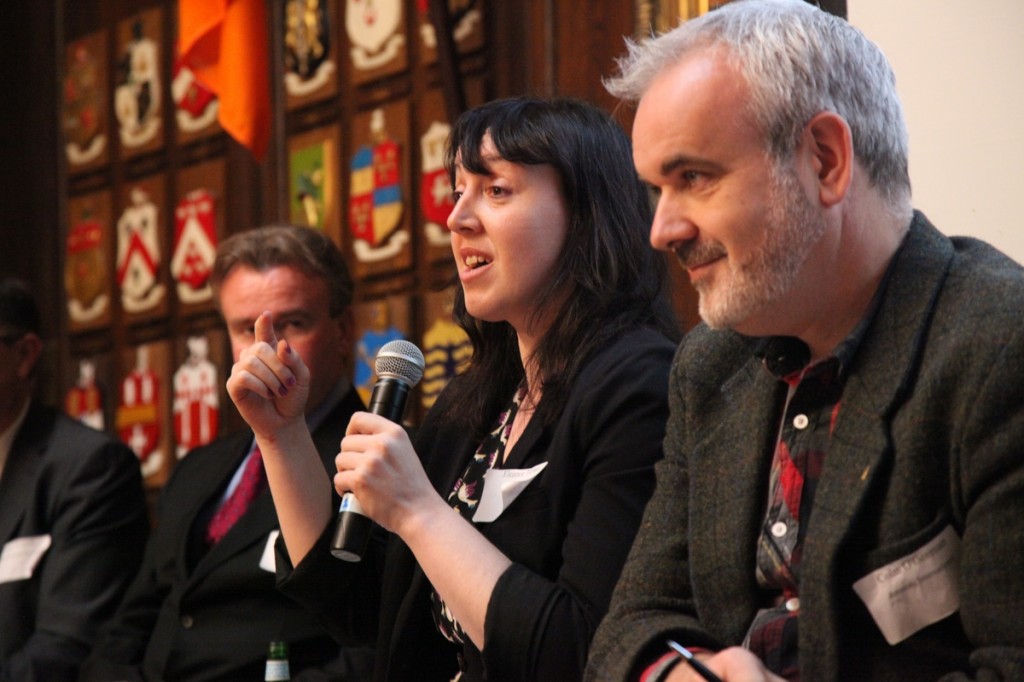“Citizenship or Self-Interest: which rules in Ireland?”
Launch of The People’s Conversation – Rethinking Citizenship for 2016
The Oak Room, Mansion House, Dublin
11th October 2014
Report by Dónall Geoghegan, Rapporteur
Introduction
Over 100 people attended an open “People’s Conversation” hosted by The Wheel in the Mansion House, Dublin, on 11th October. Participants first heard some contributions from prominent public figures, including European Ombudsman Emily O’Reilly, and then had an opportunity to ask questions and express their own views.
Fergus O’Ferrall, Co-Chair of the Reference Board of The People’s Conversation and former Chairperson of The Wheel, opened the event. Acting as host of the proceedings, he outlined the background to this initiative by The Wheel, in conjunction with the Carnegie UK Trust, to develop a new collective understanding for citizenship in Ireland. He described today’s event as a ‘taster’ for follow-up conversations involving citizens and organisations throughout the country.
Ryan Meade, Programme Leader for The People’s Conversation, described citizenship as being about much more than just a passport or voting. It’s about what we expect and what is expected of us, our rights and responsibilities to each other. It’s the basis for a shared understanding of what a fair and just society means. He made the case for redefining Ireland’s sense of direction as we exit the economic crisis, in the context of the upcoming anniversary of the 1916 rising and the President’s ‘Ethics Initiative’. He said The Wheel makes no apology for its advocacy of ‘talk’, believing that we need to encourage dialogue as a precursor and engine for change.
Speakers
Emily O’Reilly, European Ombudsman and formerly Ireland’s Ombudsman, journalist and broadcaster, set out her own journey in challenging Ireland’s sense of direction. She described the negative reaction to her speech in November 2004 where she addressed the social downside of the ‘Celtic Tiger’ and how this comfort and complacency was broken by ‘almost existential angst’ followed the economic and banking crisis. And now as the “Tiger is beginning to wink at us again”, she detects the same lack of understanding of the common good, leadership and ‘guiding ethic’ in Irish society. She abhors the concept of a “Celtic Phoenix” without a fundamental reorientation. She wished the initiative well in its efforts but emphasised the need to ensure action follows words. [The full text of Emily O’Reilly’s speech is available here]
Tom Clonan, retired army officer, journalist, lecturer and author, gave an account of his own personal history. He recounted how his own understandings of citizenship and ethics evolved from his peacekeeping role in the Middle East to his whistleblowing of sexual harassment and bullying within the army. He believes that Government has engaged in an “open, arrogant breach” of the trust place in them, compounding the damage inflicted by Ireland’s bailing out of the banks and the Euro. He is still proud of our flag but believes we need to develop our understanding of the republic as being about our society, and not an economy.
Colm O’Gorman, Executive Director of Amnesty, former Senator and founder of One in Four, argued that we need to keep having conversations, and not in the ‘usual places’, as change comes from below. He emphasised that our citizenship is not just of this country, but of the world. He challenged the Irish people to “own up how badly we screwed up”, and admitted his own previous embrace of the “mass orgy of a pretend success”. He characterised our condition as “contented powerlessness and wilful blindness” and criticised our lack of concern for marginalised people. He said that “if we’re to become a full republic we should stop celebrating” and recognise the “great betrayal” of the ideals of a century ago, when we were a “profoundly radical idea”. We should examine how we might provide for economic and social rights, with responsibility being directly vested in the state. He finished by urging citizens to go beyond finger-pointing to build a “new common good”, saying “we need to change if we want power to change”.
Eleanor Tiernan, comedian, writer, author and Project Manager of the ‘National Therapy Project’, described how her concerns for the psychological well-being of the electorate have led her perform ‘live therapy sessions’ at venues around the country. She focuses on the dysfunction that defines our public life, characterised as “twill-do-ism”, a combination of high public standards and low self-esteem and a toxic relationship between citizenship and Government. She pointed to the risk that consumerism, and our use of social media, mobiles and TV, will become a new “secular Angelus”, especially for the young, and contended that a strong public media is essential to citizenship.
Jillian van Turnhout, independent Senator and former Chief Executive of the Children’s Rights Alliance and President of NYCI, described the influences of her background in NGOs, in the private sector and in advocating for children’s rights on her role in an unrepresentative Seanad. She believes that citizens who have a vote need to challenge themselves to go beyond a selfish analysis and consider others in their decision making. She challenged us to move beyond our obsession with unearthing the past, to deal with current problems and to consider how we can provide for universal rights. We need to move beyond pointing to where the problems are and have conversations about solutions. We need to be demanding of and have high expectations of our politicians.
Discussion
A wide range of matters were raised by participants from the floor. The contributions focused on the following key themes:
Global Citizenship
Our understanding of citizenship must include our role as global citizens, not as an ‘add-on’ but as a central facet of our identity. This implies examining our obligations, as individuals and as a country, to contribute to the rest of the world and to shoulder responsibility living within a global environment. Development education can play an important role here. The actions of our Government on national and international levels need to be guided by this global identity, rather than narrow self-interest such as trade.
Reforming our Democracy: National and Local
While power in our constitution is vested in the people and powers are delegated to our legislature and executive government to work for the common good, often these institutions and our administrative systems fail us and need to be challenged. The ‘establishment’ seems not to trust the people and property rights seem to trump the sovereignty of the people. We have not heard an apology for what befell the country. We need greater checks and balances within our political system, with a strengthened role for the people, including through a reformed Seanad, the Open Government initiative and a new more inclusive model of Social Partnership.
Our politicians must not just ‘tell the truth’, but ‘act the truth’ when in power. While politicians may themselves display integrity, they operate within a ‘dishonest’ context. The reform of Local Government should be central to our overall political reforms, particularly given the contribution that local government made to our economic crisis through land rezoning.
Inclusion
Ireland is far from being an inclusive society and many people are excluded from full participation in Irish life. These include people with disabilities who are anxious to make a contribution through work and through opportunities to speak for themselves. People from other countries are demeaned through use of phrases such as ‘non-national’ and the rights of asylum seekers to participate are severely curtailed through direct provision. People seeking to be recognised as citizens often go through a tortuous process. Government’s role in ensuring inclusion is critical, particularly in fostering belonging among immigrants. Efforts to recognise racism and promote inclusion, such as ‘Sport against Racism’, need to be supported.
Citizenship and Participation
The fundamental understanding is that we are citizens, not consumers. That means that active citizenship is essential and must be nurtured. Participation in our democratic system should not start and end with voting, there are different ways of engaging different people in exercising their citizenship. Consultation with people can be very limited, we need to involve people directly, and particularly young people. NGOs plays an important role, but many individuals who contribute in the sector need support to ensure they are not overwhelmed. In addition, in some instances the sector needs to address its own internal democratic processes.
The serious gaps in an understanding and a sense of citizenship needs to be tackled. We need to systematically tackle the problem of low engagement in democratic processes which leave many people out, including addressing low registration among immigrants and other groups, and low voter turnout. Many people feel let down and that they “don’t count”, but there are ways addressing this by involving them in tried and tested non-partisan programmes in the community and in schools.
This initiative provides a good vehicle to progress active citizenship. It needs to be tangible and focused on citizens, not just civil society itself.
Our Policy Framework
We need to understand and challenge the social, economic, environmental and cultural underpinnings of our work on citizenship. There is a sense that our institutions, in Ireland and the EU, are following a neoliberal path that values the economy over other factors, including social and environmental concerns, and that clash with the concept of citizenship. The lack of awareness of our environment puts future generations at risk: we need to expand our understanding of the “common good” to include them. The significant role of our culture and history must also be acknowledged in defining our citizenship.
Closing Comments
Speakers responded to points raised on the floor.
Tom Clonan appreciated the opportunity to explore the issues raised today. He believes that those who put their heads above the parapet are often the victims of retaliation. He said his whistleblower role has marked him out, joking that he doesn’t get invited to sit on the boards of banks. He agrees that some elements of the state are failing.
Eleanor Tiernan said she is worried that today may be just talk, that there is an onus on everyone to follow up on it, including using social media, and to be specific in what we espouse.
Colm O’Gorman said that the day was thought-provoking. He picked up on the disconnect between a dysfunctional economy and a society that is not functioning properly. He warned that we should be careful how we approach our social advocacy, for example referring to the economic case for equality rather than the fact that it makes social sense. He believes that the budgetary process needs to be opened up to debate in advance. He also warned that we need to be careful regarding dismantling a system that could be made to work, e.g. direct provision could work if it was for a very short interval. He returned to his earlier theme that contributions to our downfall must be owned more widely by citizens and institutions.
Jillian van Turnhout emphasised the need for a much fuller understanding of citizenship across society. She believes that people need to demand a rights-based model and to move on from being thankful for what they get handed down to them. She concurred with the suggestions regarding the need for a more inclusive understanding of Irishness and repeated her call to “leave space for others” in the dialogue we need to engage in. She said we must “have ownership of the state”, rather than passing off responsibility by using phrases like “failed state”.
Fergus O’Ferrall thanked all participants and referred to the wider philosophical context for today’s event. He pointed to contributions made by others, such as Thomas Davis, Tom Barrington and Garret Fitzgerald, on the need for ‘civic republicanism’ and the potential for analysis and collaboration through creating these kind of open and structured debates. He believed that the process launched today offers an opportunity to recreate and reform our democratic processes, and was conscious of the risk posed by Emily O’Reilly that we would ‘revert’ to normal. He believes it is up to us to empower ourselves and urged participants to stay involved and to further develop the “People’s Conversation” at local and organisation levels.
Ryan Meade thanked Fergus for chairing the event. He referred to the open approach of The Wheel to developing this process. He asked people to go onto the dedicated website for the People’s Conversation and register so that The Wheel can be of assistance in their efforts. He finished by reminding participants that action comes first through conversation and urged them to continue the dialogue.
